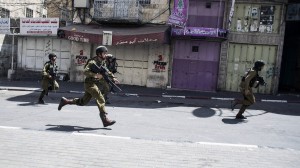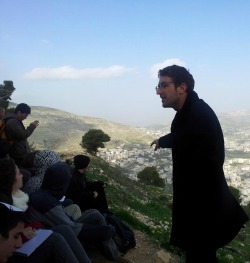--Bill to force-feed hunger-striking Palestinian detainees rushed through first reading.**
--Bill to force-feed hunger-striking Palestinian detainees rushed through first reading.**
 Israel's occupation of the West Bank is indefensible
Israel's occupation of the West Bank is indefensible
by Max Fisher
There is a pleasant fiction in the United States and parts of Israel that the Israel-Palestine conflict exists in a sort of suspended animation, on pause and simply awaiting diplomatic resolution. But the truth is that the conflict, which over the decades has included several wars, countless terrorist attacks, and two Palestinian uprisings, never really goes away for most of the 12 million people in Israel and the Palestinian territories. And periodically it will escalate so rapidly, with such relatively slight provocation, and to such a level of severity, that the rest of us can't ignore what every Palestinian and many Israelis already know: the conflict may be quieter today than in the past, but it is still active, still destroying lives and communities, still scarring these two societies, every day.
The following article by Peace Now's Secretary General Yariv Oppenheimer, headlined The Bloody Shrapnel, was published in today's edition of the Israeli daily Yedioth Ahronoth:
We had good reason to keep our fingers crossed during the negotiations in hope of a breakthrough; we had good reason to pull our hair out when the minister of housing kept issuing tenders for settlement construction; we had good reason to be angry when we saw the footage of the unjustified shooting in Bituniya; we had good reason to become angrier when the government ignored the Palestinian prisoners' hunger strike. It was obvious that the despair, the hate, the hostility and the anger on the Palestinian side would find their way out.
We knew that time is not on our side, and that this was a matter of crucial decisions and human lives. Seven years of quiet, in which we could have improved our relations with the Palestinians and achieved a peace agreement, had been wasted.
 Please join us for a briefing call with Lior Amichai, the director of Peace Now’s Settlement
Watch Project on Friday June 20 at 12:00pm Eastern Time.
Please join us for a briefing call with Lior Amichai, the director of Peace Now’s Settlement
Watch Project on Friday June 20 at 12:00pm Eastern Time.
Lior Amichai is a world renowned authority on West Bank settlements. He has been with Peace Now’s Settlement Watch
project for the past two years. He spends his time collecting and analyzing data on settlements in the West Bank
and East Jerusalem both on the ground and from the air. To view a new short video documenting the work of Lior and
Settlement Watch, click here.
Lior will highlight current trends in West Bank settlement construction, talk about particular settlement hot-spots and comment on the current crisis stemming from the abduction of the three teens in the West Bank and its link to the settlement enterprise.
Listen here.
To receive a link of the recording, please email Katherine Cunningham at KCunningham@peacenow.org APN will send you a link to the recording
of the call as soon as it is available
Peace Now’s Settlement Watch project is recognized worldwide as the authority on settlements in the West Bank and East Jerusalem.
--Peace Now Secretary General writes in Yedioth Op-Ed that the kidnapping came as no surprise.**
Some Hard Truths about Settlements…
- Settlements are antithetical to peace. Continued settlement construction will destroy the very possibility of peace and leave Israeli decision-makers with an impossible choice: be a democracy and give full rights to the Palestinians, at the cost of Israel's Jewish character, or deny rights to the majority of the people under Israeli rule - which the Palestinians will soon be - validating accusations that Israel is increasingly an Apartheid-like state.
- Settlements are, at every level, a liability for Israel. It is because of settlements that the route of Israel's "separation barrier" has been distorted, lengthening and contorting Israel's lines of defense. The settlers' presence in the West Bank places a heavy burden on the IDF, and a heavy economic, moral, and political burden on all Israelis.
- It is because of settlements that Israel is forced to rule over a huge - and growing - non-Jewish, disenfranchised population, contrary to basic democratic values. Settlement policies and the actions of settlers erode Israel's image in the world as a democratic state that respects the civil rights of all people under its rule.
- Settlement expansion understandably extinguishes hope among Palestinians that Israel is serious about peace. It destroys the credibility of Palestinian moderates - Israel's best partners for peace - who reject violence and tell their people that negotiations will deliver a viable state. After more than four decades of watching settlements grow to take up more and more land and damage the fabric of their lives, Palestinians view settlement construction today as a litmus test of Israeli seriousness about peace.
- Past negotiations suggest that a peace deal is possible in which most settlers remain where they are, as part of a land-swap deal. Existing settlements already make such arrangements complicated; if settlements continue to expand, creating new facts on the ground in the West Bank and East Jerusalem, they will further complicate the situation and could render an agreement impossible. That, after all, is the goal of the settlements and of many of those who support them.
Listen to APN's briefing call with Lior Amichai, the director of Peace Now’s Settlement Watch Project. Click here.
Return to the Main "Settlements" Page
YOU can help reclaim Israel's future by standing against settlements. Here are actions you can take right now:
Americans for Peace Now (APN) today expressed deep concern for the safety of the three Israeli Yeshiva students who were kidnapped last Friday in the West Bank. Our hearts and prayers are with the three and with their families. We stand in solidarity with their families and the people of Israel.
APN is also concerned about the possible repercussions of the crisis and calls on all parties involved to do their utmost to ensure that the three return home unharmed and that their abduction does not further exacerbate an already volatile situation.